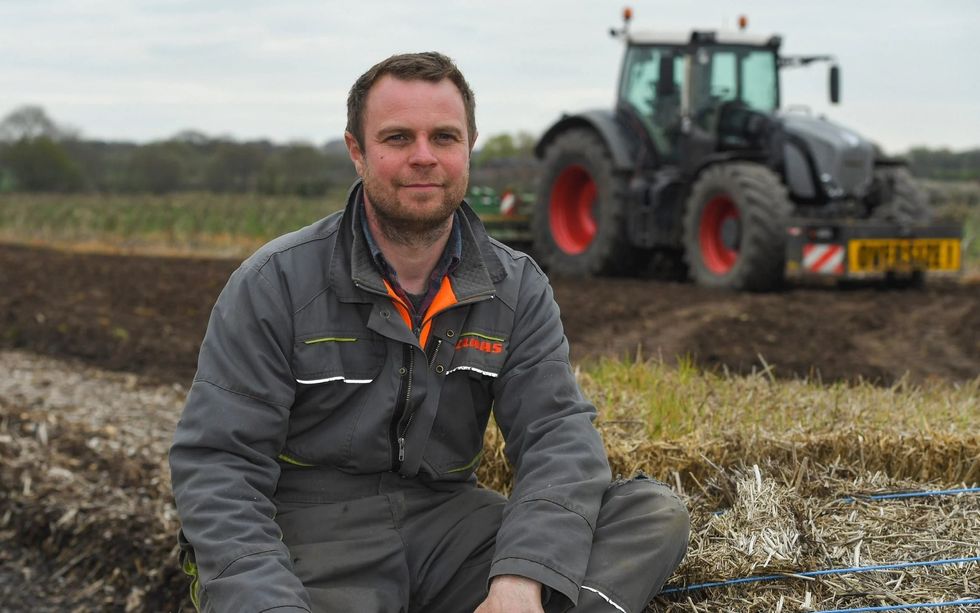Shock data shows Labour is NOT being honest about death sentence on family farms as Blair adviser says 'do to farmers what Thatcher did to miners'
Latest modelling shows an average farm’s inheritance tax bill could be 159 per cent of its profit
Don't Miss
Most Read
Labour’s proposed inheritance tax changes could prove a death sentence for many small and medium-sized farms, new modelling from the Country Land and Business Association (CLA) has revealed.
Despite government assurances that ‘small farms’ won’t be affected, the CLA’s modelling shows that tax changes could wipe out farm profits entirely, inviting stagnation and in many cases force sales of land to foot tax bills.
The model found a typical 200-acre arable farm in England owned by an individual with an expected annual profit of £27,300 would face an IHT tax bill of £427,000 in the event of a death.
If spread over a period of ten years, this would require the farm to allocate 159 per cent of its profit each year to cover the tax bill.
To meet this bill, successors could be compelled to sell 20 per cent of their land- roughly 40 acres- rendering their farm unviable.
This sale would also be subject to Labour’s capital gains tax raid, representing a final kick in the teeth for farmers already having to break up land that may have been passing through their family for generations.
This comes after former Labour adviser John McTernan told GB News' Patrick Christys last night: "We can do to farmers what Thatcher did to the miners. It's an industry we could do without. We don't need small farmers."
McTernan's view has drawn fierce criticism online with many suggesting it highlights Labour's attack on farmers not a necessary money raising policy, but an ideological attack driven by the politics of envy, ignorance, vindictiveness and gross stupidity.
Gavin Lane, Deputy President of the Country Land and Business Association (CLA) said: “Either the government isn’t being honest with the public about the true impact of these reforms, or they don’t understand the nature of rural businesses.
“I'd like to believe it is the latter and that they are prepared to listen to our input rather than continually trying to dismiss it.

The CLA's modelling calculates the potential IHT bill for differing size farms, showing family farms WILL be affected
|CLA
“While they frame this as a tax on the wealthy, the reality is that ordinary family farms will be hit just as hard.
“Asking farms to use their income to pay a huge capital tax bill over ten years, if indeed it is possible, will threaten the future of investment and the viability of the business.”
The modelling paints a slightly less catastrophic picture for married farming couples who qualify for further tax reliefs, but it is still bleak.
For example, a 250-acre co-owned arable farm in England with an expected annual profit of £34,130 would face an IHT tax bill of £267,000.
If spread over a period of ten years, this would require the farm to allocate 78 per cent of its profit each year to cover the tax bill.
The CLA’s model highlights that family-run farms – typically asset-rich but cash-poor – would be forced at best into a cycle of stagnation, asset sales, or debt to cover this tax burden, threatening the long-term viability of the UK’s rural landscape and food security.
Farm ownership statistics don’t exist, but Jimmy Tse, senior tax adviser at CLA, said: “Based on my current workload, what I typically see is about 50 per cent of farms are co-owned between husband and wife, another 10 per cent is being managed by a widow and the rest of the farms are owned by a sole trader or one spouse.”

Olly Harrison, a farmer in Cheshire, says he now can't afford to die
|Olly Harrison
Judicaelle Hammond, director of policy and advice at CLA, said: “As soon as you hit the 250 acres mark it will wipe out your profits. Defra figures suggest more than 50 per cent of cereals farms are above 250 acres, so this is actually going to hit quite a lot of people.”
Ms Hammond also highlighted the Chancellor’s belief most farms wouldn't be affected as they can claim extra relief as a married couple was wrong.
“Those reliefs don’t account for personal predicaments. It does not apply to widows, likewise people who die within seven years [the amount of time it takes to transfer ownership of a farm without incurring tax].
“As a result, our members are worrying about dying. No one knows when you will die.”
Tim Bonner, Chief Executive of rural lobby group the Countryside Alliance, said: "All over the country there are old men and women sitting in farmhouses absolutely terrified that their death will see the end of generations of their family farming their land.
"I know some of them and cannot overstate the mental anguish this is causing.
"I’m a great believer in cock up over conspiracy and do not believe that Rachel Reeves has set out to be deliberately cruel. There must be ways of addressing the avoidance of inheritance tax through agricultural property relief without punishing innocent farmers."
The CLA stresses their predictions are only a model, and the real world is often more complicated.
However, the figures they employed in the modelling are actually a conservative estimate as they do not include things like diversified income, farm shops, farm stock, development potential or holiday lets, all of which would push up a farm’s value.
Roughly 69 per cent of farms diversify in England.
LATEST FROM MEMBERSHIP:
This modelling comes as a row between the National Farming Union and the government rumbles on with the latter claiming only a quarter of farmers will be affected, and they’ll all be wealthy.
But the NFU rejects this, arguing Defra’s own figures show it will more likely be two thirds of farms.
The CLA highlighted the fact the Treasury figure comes from an analysis of claims under the APR tax scheme, whereas their modelling is derived from actual farms across England.
Critics have also taken aim at the paltry amount of money the scheme will raise- £500 million a year by 2030- enough to fund the NHS for one day and five hours.
Labour argues the figure is still crucial in rebuilding the nation’s finances after the Conservatives left a £22 billion black hole.
Thousands of farmers are set to protest the Chancellor’s budget on November 19.











